If you’re looking for a reliable bonding agent for concrete, it’s important to consider a few factors before making your purchase. Not all bonding agents are created equal, so it’s crucial to choose one that will meet your specific needs and provide a strong, long-lasting bond.
First and foremost, consider the type of project you’ll be using the bonding agent for. Different bonding agents may be better suited for specific types of concrete or applications, so make sure you choose one that is appropriate for your needs. Additionally, consider the environment the concrete will be exposed to, as this can affect the strength and durability of the bond.
When it comes to selecting the best bonding agent for concrete, it’s also important to pay attention to the product’s features and specifications. Look for a bonding agent that provides a high-strength bond, has a fast curing time, and is easy to mix and apply. You may also want to consider whether the product is water-resistant or able to withstand extreme temperatures.
If you’re still undecided on which bonding agent to choose, ask yourself some key questions. What type of concrete are you working with? Do you need a rapid setting bonding agent or is a slower setting time acceptable? What kind of resistance does your project require? By taking the time to carefully answer these questions, you can make an informed decision and choose the best bonding agent for your concrete project.
10 Best Bonding Agent For Concrete
| # | Product Image | Product Name | Product Notes | Check Price |
|---|---|---|---|---|
|
1
|
The product is ideal for bonding concrete and as an admixture for portland-cement mortar.
|
|
||
|
2
|
It is ideal for bonding various surfaces such as wood, tile, glass, hard foam, porous surfaces and concrete.
|
|
||
|
3
|
It is ideal for anchoring and crack repair due to its epoxy adhesive properties.
|
|
||
|
4
|
It is ideal for anchoring threaded bars in uncracked concrete with a super strength adhesive system.
|
|
||
|
5
|
It is an ideal multi-purpose concrete bonding additive used for various concrete projects, including repairs and renovations.
|
|
||
|
6
|
It is ideal for repairing concrete surfaces such as driveways, sidewalks, and patios with cracks or holes.
|
|
||
|
7
|
The product is ideal for heavy-duty bonding and filling applications in various materials, including wood, metal, and concrete.
|
|
||
|
8
|
The product is ideal for improving the adhesion of coatings and mortars to difficult surfaces such as concrete, stucco, and tile.
|
|
||
|
9
|
It is ideal for bonding new concrete to existing surfaces, such as walls, floors, and countertops.
|
|
||
|
10
|
It is ideal for bonding new concrete to old concrete, masonry surfaces, and improving the adhesion of coatings and patches.
|
|
1. Sika 187782 R, White, Concrete Bonding Adhesive, Admixture For Portland-Cement Mortar, 1-Gallon
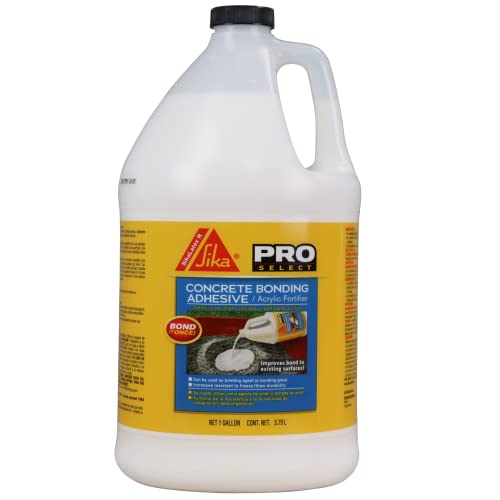
This 2-in-1 product is a reliable and versatile solution for enhancing the performance of mortar and concrete. It functions as both a latex bonding agent and an admixture, offering a non-reemulsifiable bonding adhesive and fortifier that improves the bond between old and new concrete.
The product's unique formulation provides a host of benefits. As an admixture, it can replace water in cement-based products, leading to improved adhesion, a surface with higher density, and enhanced overall performance. When mixed with sand and Portland cement, it also functions as a bonding grout or prime coat, providing a secure and long-lasting bond.
The product's performance is impressive, with increased adhesive strength of mortar and concrete when used as a bonding grout. It does not produce a vapor barrier, ensuring that the surface remains breathable. Additionally, the product offers increased resistance to freeze-thaw cycles, making it an ideal choice for outdoor applications.
2. Crystal Clear Non-Toxic Adhesive For Multi-Surface Bonding
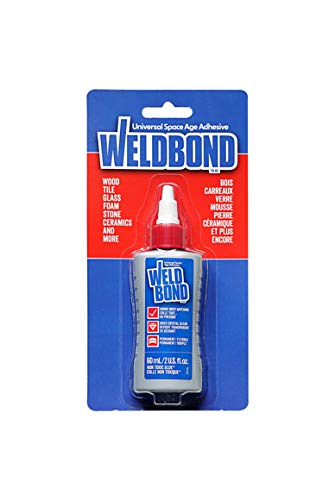
Introducing the remarkable 2oz GP Bond Adhesive, a high-quality adhesive that is sure to meet all your bonding needs. This adhesive boasts an elegant design and a smooth finish, making it not only incredibly functional but also visually appealing. This top-of-the-line adhesive is manufactured in Canada, ensuring that you receive a product of exceptional quality.
Crafted with precision, the 2oz GP Bond Adhesive is a reliable and long-lasting solution for all your bonding needs. Its superior formula guarantees a firm hold that will keep your materials securely attached for an extended period. Whether you need to bond metal, plastic, or wood, this adhesive will get the job done with ease.
The 2oz GP Bond Adhesive is incredibly easy to apply, with a smooth consistency that ensures even coverage. Its versatility allows you to use it for a variety of applications, from DIY projects to professional use. You can rely on its strength and durability, making it an excellent choice for both small and large-scale projects.
The elegant design and smooth finish of this adhesive make it not only functional but also visually appealing. Its compact size makes it easy to carry around and store, making it a convenient solution for all your bonding needs. The 2oz GP Bond Adhesive is manufactured in Canada, ensuring that you receive a product of exceptional quality.
3. Pc Anchor-Crete: Powerful Crack Repair
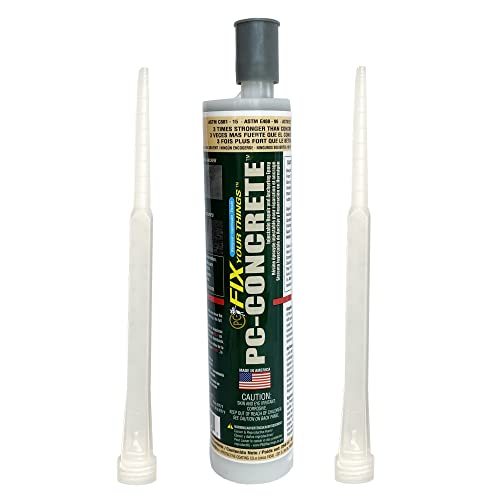
Introducing the two-part epoxy adhesive paste that's specifically designed for filling and repairing cracks in concrete, and anchoring threaded rods, bolts, and dowels into concrete, grout-filled block, and unreinforced masonry. Whether you're working on indoor or outdoor projects, this high-tack paste is perfect for damp environments and can be used in vertical applications.
This two-part epoxy adhesive paste provides a work time of 20 minutes and a cure time of 4 hours (at 75 degrees F). With an application temperature range from 35 to 115 degrees F and a service temperature range from -20 to +115 degrees F, this paste is formulated to meet ASTM C881-99 standards, ensuring top-notch quality and performance.
PC-Concrete is known for its excellent performance in filling and repairing cracks in concrete, out-performing all caulks and hydraulic cements. What sets this product apart is its ability to hold on to any cleaned concrete surface and withstand expansion and contraction of concrete, making it the best solution for permanent concrete repair.
If you're looking for a reliable and long-lasting solution to your concrete repair needs, PC-Concrete is the way to go. Its superior adhesive properties and resistance to moisture make it ideal for any project, big or small. So why wait? Invest in PC-Concrete today and experience the difference for yourself.
4. Sika Anchorfix-2: Unbreakable Concrete Anchoring Solution
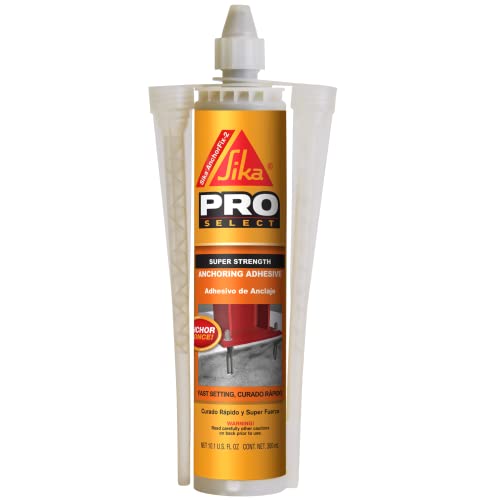
The Sika AnchorFix-2 is an exceptional two-component anchoring adhesive that is free of solvents and styrene. The modified-acrylic formula provides a reliable solution for fast-curing anchoring applications. It can be used on various surfaces including concrete, solid masonry, steel, hard natural stone, and solid rock.
This anchoring adhesive is perfect for reinforcing steel, threaded rods, bolts, and special fastening systems. Its high load capacity ensures that it can handle heavy-duty applications with ease. Additionally, it is certified for use in drinking water applications, making it a safe choice for a variety of projects.
One of the unique features of the Sika AnchorFix-2 is its ability to provide anchoring without any expansion forces. This means that it is an ideal choice for projects where expansion could cause damage or compromise the integrity of the structure.
The application process is simple and can be done with standard guns. However, it is recommended that experienced professionals handle the installation to ensure maximum safety and effectiveness.
5. 1 Qt Dap 02131 Concrete Bonder Multi-Purpose Concrete Bonding Additive
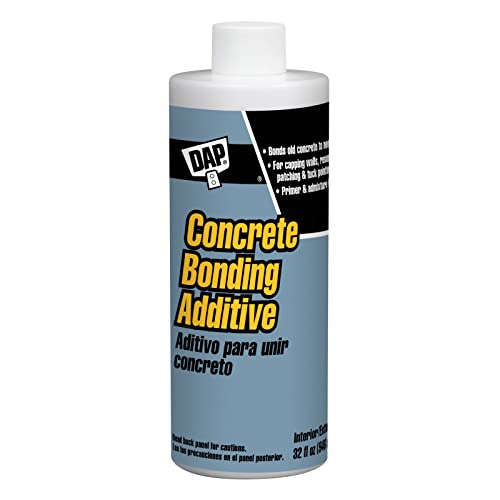
Looking for a highly durable product that is easy to use? Look no further than the Dap brand. This product is proudly manufactured in the United States, ensuring high quality and durability. With its simple design, it is incredibly easy to use, making it a great choice for anyone looking for a reliable and efficient product.
The Dap brand is known for its commitment to quality and durability, and this product is no exception. Made from high-quality materials, it is designed to withstand even the toughest conditions, ensuring that it will last for years to come. Whether you are using it for personal or professional use, you can rest assured that this product will perform at its best every time.
In addition to its durability, this product is also incredibly easy to use. With its simple design and intuitive controls, you can start using it right out of the box without any complicated setup or installation procedures. Whether you are an experienced user or a beginner, you will find this product to be incredibly user-friendly and easy to operate.
6. Damtite 04072 Concrete Super Patch Repair, 7 Lb. Pail
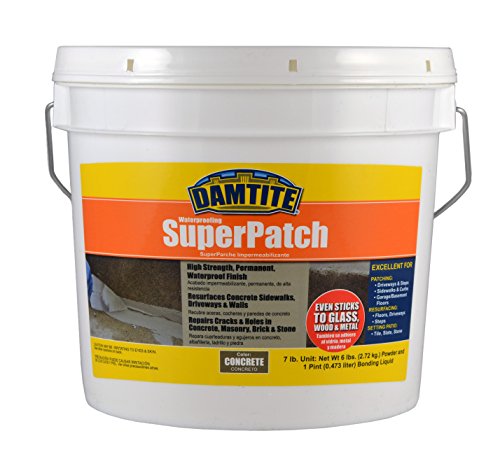
This product is a game-changer for anyone looking to resurface their concrete sidewalks, driveways, and walls. The high-strength formula provides a permanent, waterproof finish that will last for years to come.
Not only does this product resurface concrete, but it also repairs cracks and holes in masonry, brick, and stone. You can trust that this product will provide a flawless finish that will leave your surfaces looking brand new.
At 7 pounds, this product is the perfect size for tackling both small and large projects. It's easy to apply and provides a smooth, even finish. Plus, the waterproof formula ensures that your surfaces will be protected from the elements.
Say goodbye to unsightly cracks and holes in your concrete and masonry surfaces, and say hello to a beautiful, long-lasting finish with this amazing product.
7. Pc Products Pc-7 Epoxy Adhesive Paste, Two-Part Heavy Duty, 1lb In Two Cans, Charcoal Gray 167779
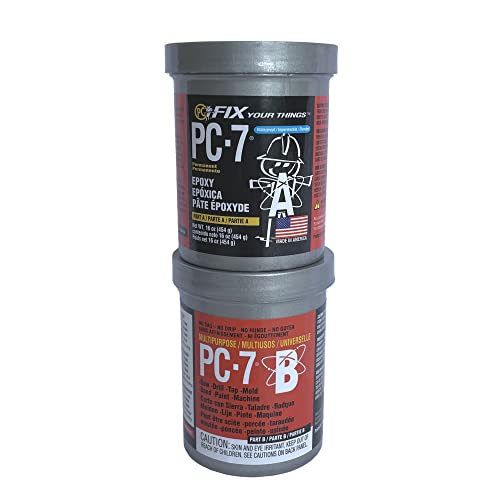
Introducing a versatile and reliable bonding agent, sealant and filler, the two-part multipurpose epoxy adhesive paste that can be used for a range of indoor and outdoor applications. This product is designed to bond many different materials, such as fiberglass, wood, concrete, metals, brick, glass, ceramic, and rubber, making it an ideal choice for a wide variety of projects.
Not only does this epoxy paste bond materials together, but it can also be used to seal leaks in oil, gas and water tanks, as well as plumbing and masonry cracks. It can even be used to fill holes, castings, and molds, making it incredibly versatile and useful for a range of applications.
The PC-7 formulation of this epoxy adhesive paste provides an extended working time, ideal for large and critical jobs where users may need to reposition work or make changes. The high "wet grab" or tack of this product also makes it easy to work with overhead and on sidewalls without any drip or sag.
With an application temperature range of 35 to 115 degrees F and a service temperature range of -20 to +200 degrees F, this product is suitable for use in a range of environments and conditions. It also demonstrates excellent chemical resistance to mild acids, caustics, detergents, gasoline, fuel oil, salt, and fresh water, making it a reliable choice for challenging applications.
It is important to note that while this epoxy paste can bond to many different materials, it will not bond to wax paper, Teflon, polyethylene, and some other plastics. It is always recommended to test a small area when in doubt.
8. Drylok 22213 Latex Bonding Agent, Gallon
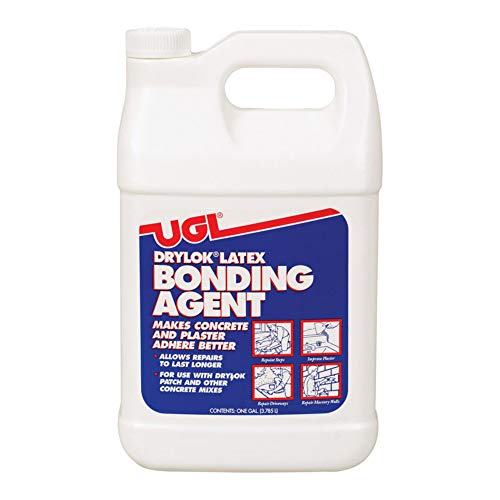
The DRYLOK Latex Bonding Agent is an essential solution for bonding concrete and plaster to difficult surfaces that are dense and slick. It is an incredibly versatile product that can be used as an additive to concrete mixes for patching, which improves the adhesion and increases the strength of the surface.
This bonding agent is specially designed to provide a strong and long-lasting bond between the concrete and plaster surfaces, even in challenging conditions. It is perfect for use on surfaces that are typically difficult to bond, such as dense, slick, or porous surfaces.
One of the significant advantages of using this bonding agent is that it significantly improves the adhesive properties of the surface. This makes it ideal for use in various applications, such as concrete and plaster patching, pointing of plaster cracks, and many other similar applications.
The DRYLOK Latex Bonding Agent is incredibly easy to use. It can be applied directly to the surface using a brush or roller, and it dries quickly, providing a strong bond in no time. It is also suitable for both interior and exterior use, making it a versatile product that can be used in a wide range of applications.
In terms of parameters and specifications, the DRYLOK Latex Bonding Agent is available in a variety of sizes to suit different project requirements. It is also easy to mix with water and can be used in both vertical and horizontal applications.
9. Quikrete Glues & Cements No. 9902 441607 Concrete Bonding Adhesive
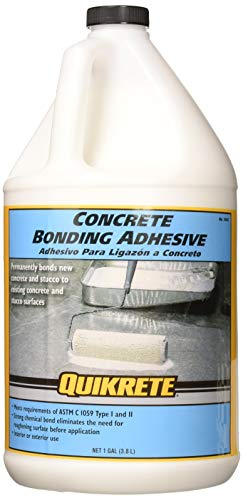
Looking for a product that is both easy to use and highly durable? Look no further than this product, proudly manufactured in the United States for your peace of mind.
Designed with user-friendliness in mind, this product boasts an intuitive interface that makes it easy to use right out of the box. Whether you're a seasoned professional or a complete novice, you'll appreciate the simplicity and ease of operation that this product provides.
But don't let its ease of use fool you – this product is also built to last. Made from high-quality materials and rigorously tested to ensure maximum durability, you can count on this product to provide reliable performance day in and day out. Whether you're using it for work or play, you can trust that this product will stand up to even the toughest demands.
And with its proud manufacturing heritage in the United States, you can feel confident in your purchase knowing that you are supporting American workers and businesses. So why settle for anything less? Choose this product for easy-to-use, highly durable performance that you can rely on.
10. Quikrete 990201 Concrete Bonding Adhesive, 1 Qt (0.95 L)
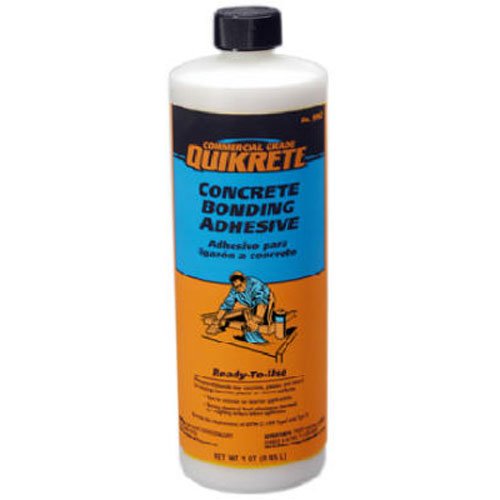
The Quikrete #990201 Quart Concrete Bonding Adhesive is a premium quality product that is designed to provide superior bonding strength and durability. This adhesive is perfect for use in a wide range of applications, including repairing cracks in concrete, bonding new concrete to existing surfaces, and anchoring bolts and other fixtures into concrete.
With its advanced formula, this adhesive is able to bond to both wet and dry surfaces, making it an ideal choice for outdoor projects or applications where moisture is present. It is also resistant to weather, chemicals, and UV rays, ensuring that it provides long-lasting performance in even the harshest conditions.
The Quikrete #990201 Quart Concrete Bonding Adhesive has a low VOC formula, making it safe and environmentally friendly to use. It is easy to apply, with a brush or roller, and dries quickly, allowing for fast project completion.
This bonding adhesive comes in a quart-sized container, providing ample coverage for most small to medium-sized projects. It is compatible with all types of concrete, including precast, poured-in-place, and decorative concrete, making it a versatile choice for a variety of applications.
In terms of technical specifications, the Quikrete #990201 Quart Concrete Bonding Adhesive has a bonding strength of 3,000 psi, which is more than enough to provide a strong and durable bond between surfaces. It has a working time of approximately 15 minutes, allowing for ample time to make adjustments before it sets. Once fully cured, it has a light gray color that blends in seamlessly with most concrete surfaces.
Best Bonding Agent For Concrete FAQs
Can bonding agents be used to repair damaged concrete surfaces?
Yes, bonding agents can be used to repair damaged concrete surfaces. In fact, they are an essential component in concrete repair, restoration, and rehabilitation work. Bonding agents are designed to improve the adhesion between the old and new concrete surfaces. They work by penetrating the pores of the old concrete and creating a chemical bond with the new concrete. This bond helps to prevent the formation of cracks and delamination, which can occur when the new concrete is applied directly to the old surface.
There are different types of bonding agents available in the market, including epoxy, acrylic, and latex-based. The choice of the bonding agent depends on the type and severity of the damage, as well as the environmental conditions of the site. It is important to follow the manufacturer's instructions for the application of the bonding agent, including surface preparation and curing time.
In summary, bonding agents are an effective solution for repairing damaged concrete surfaces. They help to ensure the longevity and durability of the concrete structure.
Can bonding agents be used with all types of concrete surfaces?
Bonding agents are commonly used in construction projects to enhance the bond strength between two different surfaces. However, not all types of concrete surfaces are suitable for bonding agents. Bonding agents are usually designed to be used with new concrete surfaces, which are free from contaminants, such as oils, dirt, and dust.
When it comes to old or damaged concrete surfaces, bonding agents may not be effective, as they may not be able to penetrate the surface and create a strong bond. In some cases, it may be necessary to remove the old concrete surface and replace it with new concrete before using bonding agents.
It is important to note that not all bonding agents are suitable for all types of concrete surfaces. Some bonding agents may be designed for use with specific types of concrete surfaces, such as smooth or rough surfaces. Therefore, it is important to consult with a professional before using bonding agents on any concrete surface to ensure that you are using the right product for the job.
How do I apply a bonding agent to a concrete surface?
Applying a bonding agent to a concrete surface is a crucial step in ensuring that the concrete adheres properly to the surface. Here are the steps to follow when applying a bonding agent:
1. Clean the surface: The concrete surface should be free of any debris, dust, or dirt. Clean the surface thoroughly using a pressure washer, and allow it to dry completely.
2. Apply the bonding agent: The bonding agent should be applied according to the manufacturer's instructions. Use a brush or roller to apply the bonding agent evenly on the surface, making sure to cover the entire area.
3. Allow the bonding agent to dry: The bonding agent needs to dry completely before applying the concrete. This can take anywhere from a few hours to a full day, depending on the type of bonding agent and the temperature and humidity of the environment.
4. Apply the concrete: Once the bonding agent has dried, you can apply the concrete. Make sure to follow the instructions for mixing and applying the concrete, and work quickly to ensure that it adheres properly to the surface.
By following these steps, you can ensure that the bonding agent is applied correctly and that the concrete adheres properly to the surface, creating a strong and durable bond.
How do I choose the right bonding agent for my concrete project?
Choosing the right bonding agent for your concrete project is crucial to ensure the success and longevity of your project. The first step is to determine the type of substrate you will be bonding the concrete to. Different bonding agents are designed for specific substrates such as concrete, wood, metal, or masonry. It is important to choose a bonding agent that is compatible with your substrate to ensure proper adhesion.
The second step is to consider the environmental conditions of your project. If your project will be exposed to extreme heat or cold, or if it will be exposed to chemicals or water, you will need to choose a bonding agent that is specifically designed to withstand those conditions.
Thirdly, consider the type of concrete you will be using. If you are using a lightweight or high-performance concrete, you may need a bonding agent that is specifically designed for those types of concrete.
Lastly, choose a bonding agent that is easy to use and apply. Some bonding agents require special application tools or techniques, while others are more user-friendly and can be applied with a brush or roller.
Overall, by considering the substrate, environmental conditions, type of concrete, and ease of application, you can choose the right bonding agent for your concrete project.
How does a bonding agent improve the bond strength of concrete?
A bonding agent is a substance that is applied to the surface of concrete before new concrete is poured or applied. It helps to improve the adhesion or bond strength between the two surfaces. The bonding agent works by creating a chemical reaction between the old and new concrete surfaces.
The bonding agent acts as a bridge between the two surfaces, ensuring that they bond together securely. The agent forms a chemical bond with the old concrete surface and also with the new concrete surface when it is poured or applied. This creates a strong and durable bond between the two surfaces.
The bonding agent also helps to prevent the formation of air pockets or voids between the old and new concrete surfaces. This is important because air pockets can weaken the bond strength between the two surfaces and make the concrete more prone to cracking or breaking.
Overall, the use of a bonding agent is an effective way to improve the bond strength of concrete and ensure that it remains strong and durable over time.
What are some common mistakes to avoid when using bonding agents with concrete?
There are several common mistakes that should be avoided when using bonding agents with concrete. Firstly, it is important to ensure that the surface to which the bonding agent is being applied is clean and free of any contaminants such as dust, grease, or oil. If the surface is not properly prepared, the bonding agent may not adhere properly to the concrete.
Another mistake to avoid is applying too much bonding agent. Over-application can result in a weakened bond as excess material can create a barrier between the concrete and the bonding agent. It is important to follow the manufacturer's instructions and apply the bonding agent in the recommended amount.
Using the wrong type of bonding agent can also lead to issues. There are different types of bonding agents available for different applications, so it is important to choose the right one for the job at hand.
Finally, it is important to ensure that the bonding agent has had sufficient time to dry and cure before applying any additional layers or coatings. Failure to do so can result in a weakened bond and compromised durability.
By avoiding these common mistakes, users can ensure that their bonding agents provide a strong and durable bond with concrete surfaces.
What are the best practices for using bonding agents with concrete?
Bonding agents play a crucial role in ensuring that concrete structures and surfaces adhere properly to each other. Here are some best practices for using bonding agents with concrete:
1. Surface preparation: The surface of the concrete should be clean, free of any contaminants, and roughened to ensure maximum adhesion.
2. Proper application: The bonding agent should be applied evenly and thoroughly to the concrete surface using a brush or roller.
3. Drying time: The drying time of the bonding agent should be given enough attention to allow the agent to penetrate into the concrete surface and create a strong bond.
4. Adequate thickness: The bonding agent should be applied in a thickness that is appropriate for the specific job and the manufacturer's recommendations.
5. Compatibility: The bonding agent should be compatible with the concrete mix, curing time, and environmental conditions of the project.
6. Quality of bonding agent: It is important to use high-quality bonding agents provided by reputable manufacturers to ensure the maximum strength of the bond.
By following these best practices, the bonding agent can improve the durability and longevity of the concrete structure.
What are the different types of bonding agents available for concrete?
There are several types of bonding agents available for concrete, each with its own unique properties and applications. One type is epoxy bonding agents, which are known for their high strength and durability. They are commonly used for bonding new concrete to old, as well as for repairing damaged concrete surfaces.
Another type is acrylic bonding agents, which are water-based and typically used for bonding new concrete to existing surfaces. They are also popular for bonding concrete to steel and other materials.
Polyurethane bonding agents are another option, known for their flexibility and ability to withstand extreme temperatures. They are often used in industrial settings and for applications where concrete may be subject to frequent movement or vibration.
Finally, there are also cementitious bonding agents, which are made from a combination of cement and polymers. These agents are typically used for bonding new concrete to old, as well as for repairing damaged concrete surfaces.
Ultimately, the choice of bonding agent will depend on the specific application, as well as factors such as the strength and durability required, the environmental conditions, and the materials being bonded.
What are the properties of a good bonding agent for concrete?
A good bonding agent for concrete should possess certain properties to ensure a strong and durable bond between the concrete surfaces. Firstly, the bonding agent should be compatible with the concrete surfaces to be bonded. The agent should also have good wetting properties to enable it to spread evenly over the surface. It should also have a low viscosity to penetrate the pores and cracks of the concrete surface. Additionally, the bonding agent should be able to form a strong chemical bond with the concrete surface, which can be achieved through the use of chemical adhesion promoters.
Other properties of a good bonding agent for concrete include high tensile strength, good resistance to water, and ability to withstand environmental factors such as freeze-thaw cycles, UV exposure, and chemical exposure. It is also important for the bonding agent to have a good curing time, which allows for sufficient adhesion to occur. Overall, a good bonding agent for concrete should provide a long-lasting, strong, and reliable bond between the concrete surfaces.
What is the best bonding agent for concrete?
When it comes to bonding agents for concrete, there are several options available in the market. The choice of bonding agent depends on the type of project and the surface to which the concrete will be adhered.
One of the most popular bonding agents for concrete is epoxy. Epoxy is a two-part adhesive that has excellent bonding properties and provides a high-strength bond. It is commonly used for bonding concrete to other surfaces like metal, wood, and plastic.
Another bonding agent that is commonly used is polyurethane. It is a single-component adhesive that is easy to apply and provides a strong bond. Polyurethane is ideal for bonding concrete to itself or to other surfaces like masonry, brick, and stone.
Acrylic-based bonding agents are also an option for bonding concrete. They are easy to use, quick-drying, and provide a good bond. Acrylic bonding agents are typically used for bonding concrete to itself or to other surfaces like stucco and plaster.
In conclusion, the best bonding agent for concrete depends on the specific project requirements. It is important to choose a bonding agent that is compatible with the surface and provides a strong and lasting bond.
